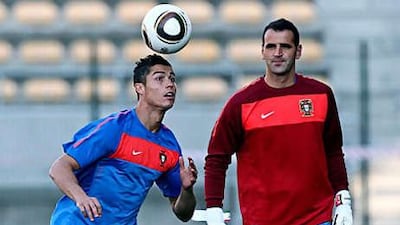For Cristiano Ronaldo, there is no such thing as a mundane match. Every game becomes an event for the super-skilled superstar. The cameras are trained upon him, and there is inevitably something to capture. Take this World Cup. Ronaldo began against Ivory Coast, rattling the woodwork with a trademark long-range strike, riling the Africans, who felt he was trying to get them sent off and collecting a caution that Portugal unsuccessfully appealed.
It proceeded against North Korea, Ronaldo contriving to control the ball on the back of his neck before scoring the sixth of Portugal's seven goals in the tournament's biggest win so far. Then came the Brazilians for a sour stalemate in which Ronaldo was a surprising choice as man-of-the-match for the third successive game. His nomination suggested Fifa simply opted for the most famous and glamorous player on show.
Now it is Spain. An Iberian derby, it offers Ronaldo the opportunity to emulate his status four years ago and become Public Enemy No 1 in the land where he plays. Then he was blamed, rather unfairly, for Wayne Rooney's red card. Now, having spent a year hankering for a move to Spain, he has spent a season at Real Madrid. As in 2006, the knockout stages of the World Cup provide both a reunion and the sort of contest normally only staged in training. Then he faced an England defence including Manchester United teammates Gary Neville and Rio Ferdinand.
Now the Real contingent of Iker Casillas, the Spain goalkeeper, Sergio Ramos, the right-back, and Xabi Alonso, the defensive midfielder, must be primed to halt their club colleague. "Cristiano is very fast, strong and a speedster with the ball at his feet," Ramos states on Real's official website. "We have to prevent him from receiving the ball and having a lot of room to work with." Vicente del Bosque, the Spain manager, made a pertinent point. "Portugal are a great team and they're about more than just Cristiano Ronaldo," he says. "It's true that Cristiano is one of their best players, but we mustn't forget that the Portuguese are the only team that still haven't conceded a goal at this World Cup.
"Their game is based around defensive solidity, pace and counter-attacking, as well as having very skilful players." Ronaldo's capacity to occupy the imagination - and, some might say, his narcissistic love of the spotlight - can obscure others. Yet after an abject start to Carlos Queiroz's regime, Portugal have kept 22 clean sheets in 26 matches and gone 19 games unbeaten. Nor is Ronaldo the most obvious contributor to their resurgence. His two years as Portugal captain have brought a solitary strike in competitive games, the unconventional and goal-difference boosting, but otherwise irrelevant, effort against the North Koreans.
His trickery enabled him to torment the minnows in the second half but it was a game when the team galvanised the captain, rather than vice-versa. The criticism voiced in Portugal is that a similarly distinguished winger of an earlier generation, Luis Figo, was a more natural leader. Ronaldo is an instinctive individualist, Figo was a team man whose sweat for the cause was visible on his face. Each has operated in a common context: a gifted team lacking a top-quality goalscorer. Pauleta and Nuno Gomes, Figo's contemporaries, were prolific at lower levels but rarely in major tournaments. The current crop are short of a striker: Liedson led the line against Ivory Coast, Hugo Almeida took over for the North Korea game and then Ronaldo was shifted into the centre to take on Brazil.
Del Bosque's praise is justified by the reliability of Eduardo in goal, the composed defending of Ricardo Carvalho, the athleticism of the flying full-back Fabio Coentrao and the penetrative runs from midfield of Tiago. But come kick-off tonight, the focus, as ever, will be on one man: Cristiano Ronaldo. sports@thenational.ae


